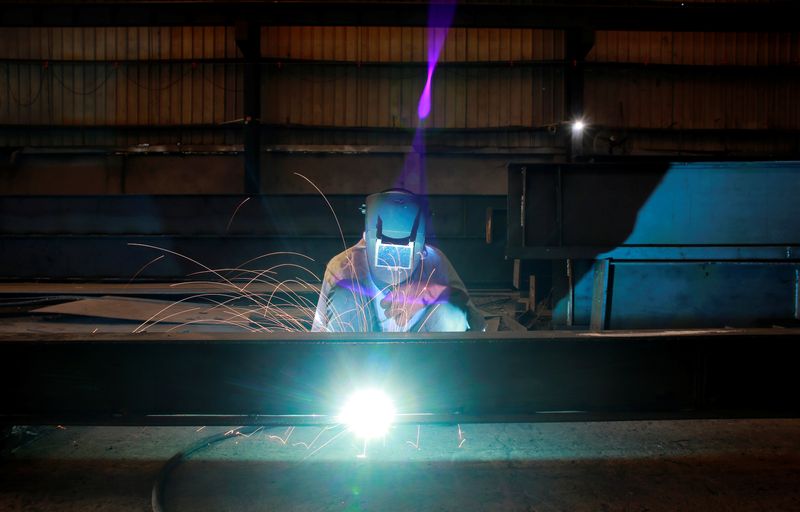India’s factory growth softened slightly in June but stayed strong
2023.07.03 01:20

© Reuters. A labourer welds an iron pillar at a building material factory in an industrial area in Dasna, in the central Indian state of Uttar Pradesh, India, January 9, 2019. REUTERS/Adnan Abidi
By Shaloo Shrivastava
BENGALURU (Reuters) – India’s manufacturing industry expanded at the second-fastest rate this year in June, albeit at a slightly slower pace than in May, supported by robust demand despite higher inflationary pressures, a private survey showed on Monday.
The Manufacturing Purchasing Managers’ Index, compiled by S&P Global (NYSE:), was 57.8 in June, down from May’s 58.7 and a tad lower than a Reuters poll expectation for 58.0.
That marked two years of the index being above the 50-mark separating expansion from contraction.
“June’s PMI results again showed robust demand for Indian-made products, both in the domestic and international markets,” said Pollyanna De Lima, economics associate director at S&P Global Market Intelligence.
“Positive client interest continued to support the manufacturing industry, driving growth of output, employment, quantities of purchases and input stocks.”
New orders and output rose sharply despite the sub-indexes easing moderately from May, driven by both domestic and international demand. Foreign demand grew for the 15th straight month.
Strong underlying demand also stoked business confidence and optimism around future business activity rose to its highest this year.
That also prompted firms to increase their workforces for a third consecutive month. However, while the employment index was the second-highest since November the rate of expansion was moderate.
Higher prices for labour and some raw materials led to increased input costs in June but the rate of inflation was only minutely higher from May and below the long-run average.
Companies passed on expenses to clients and the output prices index was at a 13-month high.
“Presented with buoyant demand, manufacturers seized the opportunity to adjust their pricing strategies. The latest increase in output charges reflected firms’ ability to pass on higher cost burdens to customers while maintaining a competitive edge,” added De Lima.
Inflation is well within the Reserve Bank of India’s (RBI) comfort zone of 2%-6% but the central bank had left the door open for future interest rate hikes.
The RBI has raised rates by 250 basis points since May 2022 but held the repo rate at 6.50% since April. It is predicted to remain unchanged until next year.








